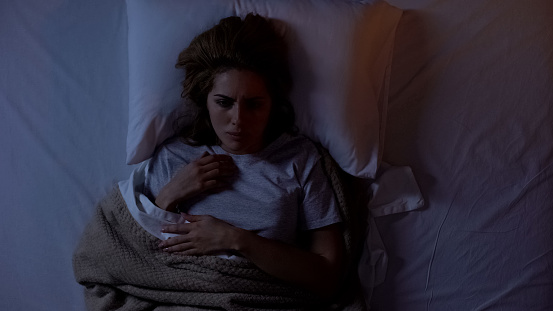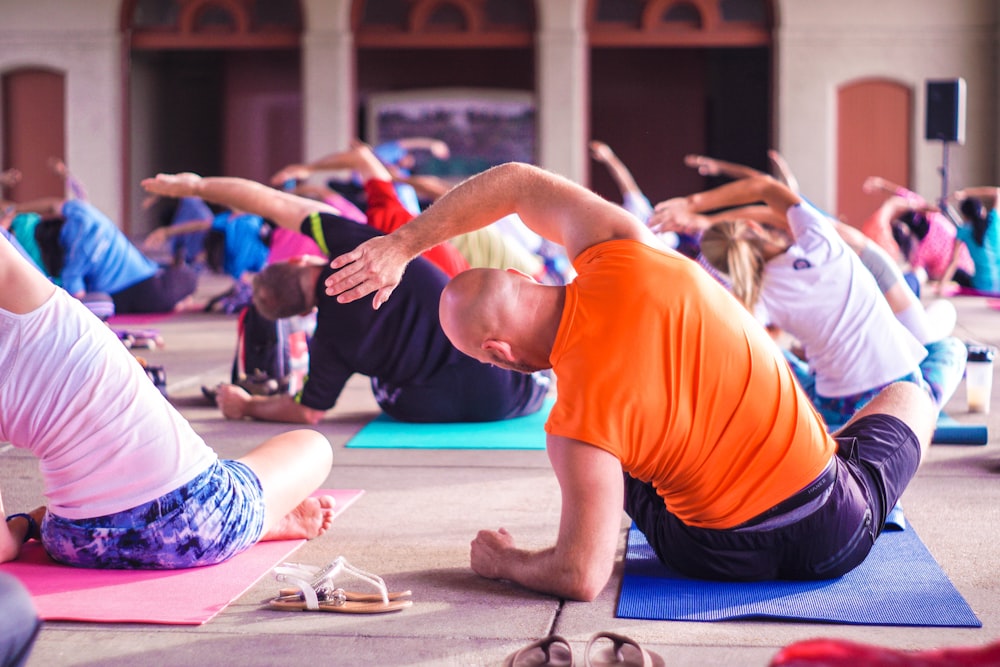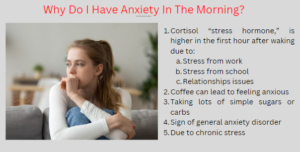
Can you have Anxiety in your Sleep? Unfortunately, the answer is yes. Anxiety is a very common and often misunderstood condition. It affects almost everyone to some extent. In addition, it can show up in many different forms and under many different names.
So, what exactly is anxiety? It’s a feeling of fear or worry about something. It can be normal and healthy when it helps us prepare for things like social situations. However, it can become a problem when it persists or when it interferes with the way we function.
People who have anxiety might be worried about something specific, or they might have anxiety in general. Both of these types of anxiety can appear in your sleep. When it happens, it can be a nuisance and make it difficult to fall asleep. If you have it, however, it can also be a sign that you might have other mental health problems as well.
It’s important to note that this is different from nightmares. You might be wondering if you can have anxiety in your sleep and if so, how to get rid of it. Here’s everything you need to know about having anxiety in your sleep.
Contents
Can You Have Anxiety In Your Sleep?
Anxiety in your sleep can occur with manifestation as nightmares, restless sleep, generalized anxiety, and nocturnal panic attacks. Nighttime (nocturnal) panic attacks are sudden episodes of intense fear or anxiety that occur with no obvious trigger and in most instances awaken you from sleep. When this happens, it usually lasts for a short period of time, but it can be very frightening. The symptoms are similar to those of a daytime panic attack, but they’re also different.
For example, the attack will usually start with an intense sense of dread or fear. You might notice that you’re sweating, your heart is beating quickly or even skipping beats, and your thoughts are racing.
You’ll probably feel like you have no control over what’s happening to you. You might have trouble breathing or call out for help because you’re afraid something bad is going to happen to you. It is possible to experience anxiety during sleep.
Other than nocturnal panic attacks, anxiety during sleep can manifest in other ways, including:
- Nightmares: These are vivid, distressing dreams that can cause feelings of fear, anxiety, and panic during sleep.
- Generalized anxiety: Some people may experience ongoing worry or anxiety that interferes with their ability to fall asleep or stay asleep.
- Restless sleep: Anxiety can cause physical symptoms such as muscle tension, heart palpitations, or sweating, which can interfere with sleep and leave a person feeling restless and fatigued upon waking.
It’s important to note that anxiety during sleep can be a sign of an underlying anxiety disorder or other mental health condition, and it’s important to talk to a healthcare professional if you’re experiencing symptoms of anxiety during sleep or are otherwise concerned about your mental health. There are many effective treatments available for anxiety, including therapy, medication, and lifestyle changes, that can help improve symptoms and quality of life.
However, nighttime panic attacks don’t last as long as daytime ones do and typically don’t include the same level of physical symptoms that daytime panic attacks do.
What Is Anxiety In Your Sleep?
People who suffer from anxiety often worry about things that seem irrational. They might be worried about being embarrassed in a social situation or being judged in front of an audience. These worries can continue to exist even when they’re not present.
This is often called anticipatory anxiety and it can happen while they’re awake as well as when they’re trying to sleep at night. Anxiety that happens in your sleep is a type of anticipatory anxiety
It can cause you to have nightmares, which are typically different than just having bad dreams about something specific. When you have nightmares, you wake up after the dream and know what it was about. With anxiety in your sleep, however, you stay asleep and experience the fear or worry without waking up until morning.
What are Nocturnal Panic Attacks?
Nocturnal panic attacks are a type of anxiety disorder characterized by sudden and intense feelings of fear or panic that occur during sleep. These attacks typically occur during the first few hours of sleep and can wake the person up from their sleep.
During a nocturnal panic attack, a person may experience symptoms such as a rapid heartbeat, sweating, trembling or shaking, difficulty breathing, chest pain or discomfort, feelings of choking or suffocation, dizziness or lightheadedness, nausea or stomach discomfort, and feelings of detachment from reality. People who have it, experience panic in the middle of the night and wake up gasping for breath. It can be very scary and confusing.
There are many possible causes for nocturnal panic attacks, including:
- Sleep disorders such as insomnia, restless leg syndrome, or narcolepsy
- A physical condition like heart disease or asthma
- A mental health condition like PTSD or OCD
- Anxiety itself
Nocturnal panic attacks can be very distressing and disruptive to a person’s sleep and overall well-being. They can also lead to a fear of going to sleep, which can contribute to insomnia and other sleep disorders.
Treatment for nocturnal panic attacks may include a combination of medication, such as antidepressants or benzodiazepines, and therapy, such as cognitive-behavioral therapy (CBT) or exposure therapy. It is important for individuals experiencing nocturnal panic attacks to seek help from a mental health professional for appropriate diagnosis and treatment.
Causes Of Anxiety In Your Sleep

One of the most common causes of anxiety in your sleep is a sleep disorder. If you have a sleep disorder and also have anxiety, it could be difficult to tell which is the cause. In general, insomnia, sleep apnea, and narcolepsy are the most common sleep disorders that can trigger anxiety.
However, you might also suffer from a condition known as Restless Legs Syndrome (RLS). This is a neurological disorder that makes it feel like there’s energy or tension in your legs.
It can make them feel uncomfortable or even painful. When this happens, it can keep you awake at night because your body wants to move them around to relieve the feeling.
Other causes of anxiety in your sleep include:
- Genetics and family history of anxiety or panic disorders
- Stressful life events, such as job loss, divorce, or illness
- Trauma or abuse experienced in the past
- Chronic physical illness or pain
- Substance abuse or withdrawal
- Side effects of medication
- Irregular sleep patterns or poor sleep hygiene
- Excessive caffeine or alcohol consumption
- Medical conditions, such as hyperthyroidism or heart disease
- Hormonal changes, such as those associated with pregnancy or menopause
It’s important to note that these are just some potential causes, and that each person’s experience of anxiety during sleep can be unique. If you’re experiencing anxiety during sleep or are otherwise concerned about your mental health, it’s important to talk to a healthcare professional for guidance and support.
Nocturnal panic attacks cause
The cause of nocturnal panic attacks is still relatively unknown, but studies show a correlation between nocturnal panic attacks and stress. Thus they may be a manifestation of stress and anxiety that surfaces during sleep. Some professionals believe that they happen because a person’s body gets overly tired and enters a more suggestible state in which their thoughts may be more vivid than usual.
The exact causes of nocturnal panic attacks are not fully understood, but there are several factors that may contribute to their development. Here are some potential causes and triggers of nocturnal panic attacks:
- Genetics: A family history of anxiety disorders or panic attacks may increase the likelihood of experiencing nocturnal panic attacks.
- Abnormal brain functioning: Panic attacks are believed to be caused by the sudden activation of the body’s “fight or flight” response, which can be triggered by abnormal activity in the brain.
- Stress: Stressful life events, such as relationship problems, financial difficulties, or work-related stress, can increase the risk of developing panic attacks.
- Sleep disturbances: Sleep disorders, such as insomnia or sleep apnea, can disrupt sleep and increase the risk of experiencing panic attacks during the night.
- Medical conditions: Certain medical conditions, such as hyperthyroidism or heart disease, can increase the risk of experiencing panic attacks.
- Substance use: The use of certain substances, such as alcohol or drugs, can increase the risk of experiencing panic attacks.
It’s important to note that these are just some potential causes, and that each person’s experience of nocturnal panic attacks can be unique. If you’re experiencing nocturnal panic attacks or are otherwise concerned about your mental health, it’s important to talk to a healthcare professional for guidance and support.
Symptoms of anxiety in your sleep
Anxiety can happen at any time and for many reasons. Whether you have an anxiety disorder or not, it’s important to know the symptoms.
The symptoms of anxiety in your sleep can be identical to those during the day. They may include sweating, rapid heart rate, trembling, shortness of breath, heavy breathing (hyperventilation), flushing or chills, sense of impending doom (even when there’s no reason to be anxious), chest pain, rapid heart rate, numbness or tingling in your extremities, dizziness or lightheadedness and a sense that things around you are unreal.
Other symptoms include fear of dying (though you have no medical reason to think it’s true), fear of going crazy (again, with no medical reason to think it’s true), and a sense that things around you are unreal.
Nobody has anxiety all the time; anxiety symptoms tend to come and go without warning. This is called “anxiety disorder with mixed features” because the symptoms show up during both daytime and nighttime hours and across various settings.
What do nocturnal panic attacks feel like?
Nocturnal panic attacks are essentially the same as daytime panic attacks. They’ll cause you to sweat, have a rapid heart rate, be trembling, feel short of breath, have heavy breathing (hyperventilation), have flushing or chills, and will give you a sense of impending doom.
As with daytime attacks, the nocturnal panic attack may occur without any cause or trigger. In most cases, nocturnal panic attacks will awaken you from sleep.
These episodes can happen when anxiety is consuming your thoughts at night. Moreover, you may dread sleeping again leaving you tired and sleepy during the day.
How To Stop Anxiety In Your Sleep
There are several strategies that may be helpful in managing anxiety during sleep. Here are some methods you can try to stop anxiety in your sleep:
- Relaxation techniques: Practicing relaxation techniques, such as deep breathing, progressive muscle relaxation, or guided imagery, can help calm the body and mind, reduce muscle tension, and promote feelings of relaxation. The last method for avoiding panic attacks in the middle of the night is by doing something before bedtime that calms you down, like taking a bath or reading a book. This will ensure that when you go to bed, you’ll be relaxed enough to get some quality shut-eye.
- Cognitive-behavioral therapy (CBT): CBT is a type of therapy that can help you identify and change negative thoughts and behaviors that may be contributing to your anxiety during sleep. A mental health professional trained in CBT can help you develop coping strategies to manage your symptoms.
- Sleep hygiene: Maintaining good sleep hygiene habits can improve the quality of your sleep and reduce anxiety. This includes avoiding caffeine and alcohol before bed, keeping a regular sleep schedule, creating a relaxing sleep environment, and limiting screen time before bed.
- Medication: In some cases, medication may be prescribed to help manage anxiety during sleep. This may include antidepressants or benzodiazepines, which can help reduce symptoms of anxiety and promote relaxation. Your doctor can prescribe medication that helps prevent panic attacks and make them less intense when they happen. Another way is by trying meditation techniques at night—this can calm you down and help you fall asleep more easily.
- Lifestyle changes: Making changes to your diet, exercise routine, or daily habits can also help reduce anxiety during sleep. Regular exercise, a healthy diet, and avoiding stimulants like caffeine and nicotine can help promote relaxation and reduce anxiety.
- Mindfulness practices: Mindfulness practices, such as meditation or yoga, can help you stay present in the moment and reduce racing thoughts that may contribute to anxiety during sleep.
It’s important to note that managing anxiety during sleep may require a combination of strategies, and what works for one person may not work for another. If you’re experiencing anxiety during sleep or are otherwise concerned about your mental health, it’s important to talk to a healthcare professional for guidance and support.

Tips For Getting Over Anxiety In Your Sleep
Anxiety in your sleep can make it difficult to fall asleep or stay asleep at night. It might manifest as nightmares, or as a feeling of panic even if you’re not overly anxious about anything. Anxiety in the sleeping hours can affect your daytime symptoms, too.
You might find yourself getting nervous for seemingly no reason, or experiencing irritability or trouble concentrating. If you have anxiety in your sleep and want to know how to fix it, there are some methods that can help.
First, it’s important to note that this is different from nightmares. Nightmares are usually vivid memories of scary events and they happen during REM sleep when dreaming occurs. With anxiety in your sleep, on the other hand, you may feel panicky even if you don’t have any specific worries at the forefront of your mind.
Fortunately, there are some things you can do to alleviate the symptoms of anxiety in your sleep:
- Exercise: This is a great way to release stress and tension before bedtime.
- Meditate: Meditation has been shown to decrease feelings of panic and anxiety according to Harvard Medical School Research from 2012
- Don’t drink alcohol close to bedtime: Alcohol might help you fall asleep but it will likely reduce quality sleep and interrupt REM cycles which could lead to more anxiety in the morning
- Reduce caffeine intake: Caffeine acts as a stimulant so drinking it late at night might keep you awake and prevent
Can anxiety last all night?
It can be harder to shake off when it’s in your sleep. This is what can sometimes lead to a nocturnal panic attack. A nocturnal panic attack is when you experience a panic attack at night. You might have no idea what’s happening and think that something terrible has happened or is about to happen.
It can be very frightening, and the physical symptoms are usually the same as if they were happening during the day. You might hyperventilate, feel your heart race, and shake uncontrollably.
If you experience these symptoms at night, it can affect your ability to fall asleep again. It may also cause other problems in your sleep such as insomnia or vivid nightmares. If you want to know how to get rid of anxiety in your sleep, here are some tips you can try:
- Meditate before bed
- Use a relaxation technique before bed
- Keep your bedroom dark
- Use lavender oil on pillows or sheets
- Get more exercise during the day
- Take deep breaths before bed
Does sleep anxiety go away?
Yes, with proper management and treatment Nocturnal panic attacks can go away. If you’re suffering from them, they can be debilitating. However, they don’t need to be a life sentence. With proper management and treatment that includes behavioral therapy, cognitive-behavioral therapy (CBT), and medications, you will start to see improvements in your sleep quality.
You might also be able to get rid of the panic attack symptoms altogether. It all depends on your personal situation and what treatment is best for you.
It’s important to note that you don’t have to go through this alone. There are many people who understand anxiety much better than you do. You should find someone who understands what it feels like so that they can help you work through the tough stuff when it comes up. Anxiety is often not a singular problem but rather part of a larger mental health issue that needs to be addressed as well.
Is it normal to have panic attacks at night?
It is not normal for people with panic disorder to have panic attacks primarily at night, as it is not abnormal for people with anxiety disorders in general. People with anxiety and/or panic disorders can have an attack of any intensity at any time of the day or night. The frequency and severity are what determine the course of action.
However, nocturnal panic attacks are a common mental health condition. The mental condition can be sudden and frightening and this can lead to getting awoken from sleep.
Nocturnal panic attacks are quite common in people diagnosed with a panic disorder. The condition can be caused by anxiety but also it can have other stressors that can trigger it.
How long do nocturnal panic attacks last?
A nocturnal panic attack is a type of anxiety that happens during sleep. The sufferer usually has difficulty falling asleep and wakes up after feeling an intense and sudden wave of anxiety.
This attack can last anywhere from 10 minutes to an hour, with symptoms tapering off as the night goes on. They happen at irregular intervals and can happen more than once in the same evening.
Nocturnal panic attacks are not the same thing as nightmares – though they can occur during REM sleep – and are much less frightening than regular nightmares.
Most people with nocturnal panic attacks may have any or a number of the following predisposing factors: mental health conditions, genetics, major stress, or having the predisposition to stress.
Summary
Anxiety is a feeling of fear or worry about something. It can be normal and healthy when it helps us prepare for things like social situations. However, it can become a problem when it persists or when it interferes with the way we function. People who have anxiety might be worried about something specific, or they might have anxiety in general.
Both of these types of anxiety can appear in your sleep. When it happens, it can be a nuisance and make it difficult to fall asleep. If you have it, however, it can also be a sign that you might have other mental health problems as well.
It’s important to note that this is different from nightmares. You might be wondering if you can have anxiety in your sleep and if so, how to get rid of it.
People who are anxious might find themselves having nocturnal panic attacks. These can be a nuisance and make it difficult to fall asleep, but they’re also a sign that you might have other mental health problems as well.
It’s important to note that this is different from nightmares, which are when you feel like you’re in danger. If you have anxiety in your sleep, the best way to get rid of it is to talk with someone about what’s bothering you and try relaxation techniques before bed.
FAQs
What are Nocturnal Panic Attacks?
Nocturnal panic attacks are a type of anxiety that happens when you sleep. It’s different from nightmares because it isn’t limited to your dreams and can happen in the latter part of the night when you’re more awake.
Can you have anxiety in your sleep?
Yes. It happens when you are feeling anxious about something, but it can also be a sign that you might have other mental health problems as well. If having anxiety in your sleep is affecting your life, then the best way to stop the cycle is to see a therapist or doctor. They will be able to give you medication or offer other methods that could help with this problem.
Can I get rid of Nocturnal Panic Attacks?
Yes! There are many things that you can do to help eliminate nocturnal panic attacks. You may not be able to eliminate them entirely, but there are ways to limit their frequency and severity. If your anxiety was brought on by stress at work or school, try some relaxation methods such as meditation or deep breathing exercises before bed. You could also ask your doctor about taking medication if it becomes too difficult to manage.
When do nocturnal panic attacks occur?
Nocturnal panic attacks happen while sleeping. They are quite different from nightmares and can be suspected when you have the symptoms of a daytime panic attack.
What should I do if I’m having trouble sleeping due to anxiety?
If your anxiety is causing you to have trouble sleeping, there are many things that can help. One way would be to try relaxation exercises before bed, like meditation or deep breathing. You might also try taking a hot bath, reading a book, or meditating for ten minutes before bedtime.


